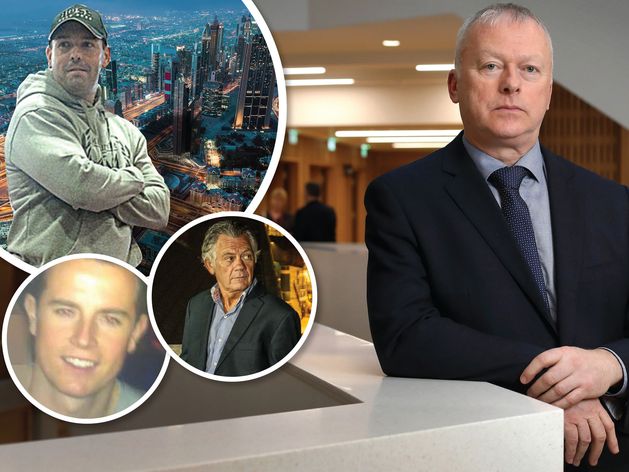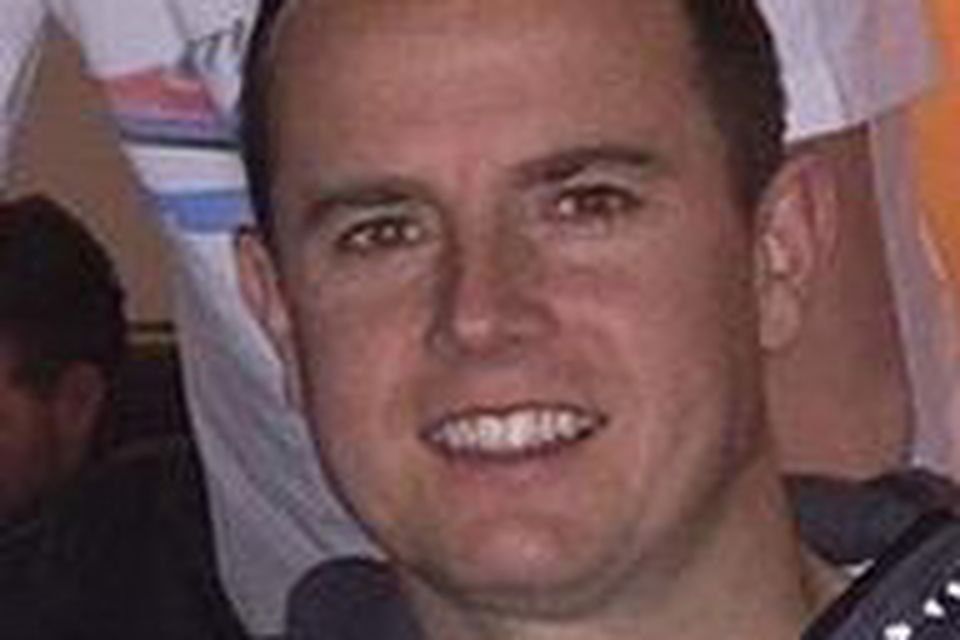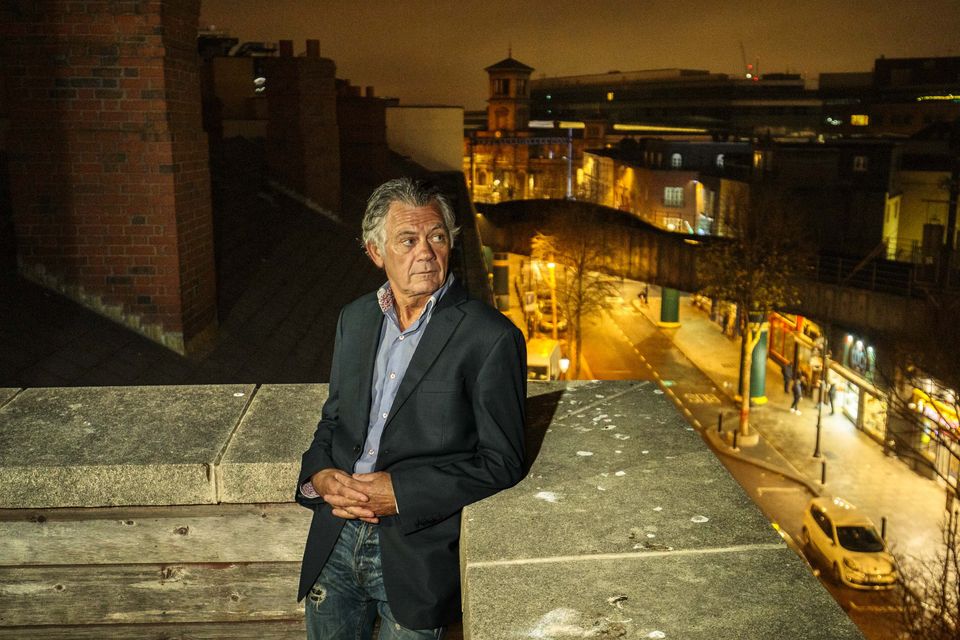Detective Chief Superintendent Séamus Boland also warned that the Hutch-Kinahan feud is “absolutely not over”
There are now 17 organised crime networks under investigation across the country, one of the force’s most senior officers has said.
Detective Chief Superintendent Séamus Boland, head of the Garda Drugs and Organised Crime Bureau (DOCB), also warned that the Hutch-Kinahan feud is “absolutely not over”, saying, “people have long memories”.
“One thing the Hutch and Kinahan gangs did learn is that killings are bad for business,” he said.
In an interview with the Sunday Independent, he also explained that the price of wholesale cocaine has dropped, indicating that there is an abundance of it for sale across the country right now.
Mob boss Daniel Kinahan
Explaining the current pecking order of Irish crime gangs, he confirmed that a crime gang, understood to be the drug-trafficking organisation known as ‘The Family’, has now overtaken the Kinahan Organised Crime Group (KOCG) as the country’s most powerful drugs importer and distributor.
“The Kinahans are a work not finished for DOCB. But they are not our number-one target in Ireland right now as much of the Kinahans’ drugs business is now conducted outside of Ireland.
“In terms of the level of drug importation and distribution in Ireland, a west Dublin crime network, who we recently targeted in a ‘Ghost’ network takedown, are the main focus of DOCB at the moment. In total, 17 organised crime networks are under investigation.”
Dismantling the Kinahan OCG remains a ‘major priority’ for Gardai- Detective Superintendent Séamus Boland tells the Sunday Independent
‘The Family’ gang was the prime target in a series of raids in September across Dublin, Wicklow, Kildare and Wexford, targeting the ‘Ghost’ encrypted phone network.
The DOCB led this probe, which resulted in several arrests and the seizure of a number of encrypted devices.
Such devices allow criminals to communicate in secret with minimal risk of eavesdropping by the authorities.
While the Kinahan cartel is not causing major headaches for specialist gardaí in Ireland at the moment, the high-ranking garda said his bureau is active in ongoing efforts to try return its Dubai-based leaders, led by mob boss Daniel Kinahan, to Ireland.
In October, Kinahan cartel lieutenant Sean McGovern was arrested in Dubai for extradition back to Ireland over the murder of Noel ‘Duck Egg’ Kirwan and other criminal offences.
The extradition of McGovern from Dubai is being seen as a test case ahead of the Irish State’s proposed moves to bring home the highest echelons of the Kinahan cartel leadership.
Sean McGovern
A European Arrest Warrant (EAW) was issued for the senior Kinahan cartel associate in 2022.
Det Chief Supt Boland said he was “very happy” with how the proposed extradition is proceeding, saying that “due process” must take place before McGovern is returned to Ireland.
“There is still a lot of interaction between law enforcement, government and legal people in both Ireland and the United Arab Emirates (UAE).
“Everything that can be done, is being done to ensure Sean McGovern’s extradition. We’ve had a great experience with our UAE colleagues on this case.
These cases can be very complex and we will accept whatever the DPP’s decision is
“Due process must now take place and it’s hard to put a timeframe on that. It’s been a very positive learning experience.”
In relation to Daniel Kinahan and the rest of the cartel leadership also hiding out in Dubai, he confirmed that gardaí have not yet received a direction from the Director of Public Prosecutions (DPP) on whether criminal charges sought by the force in relation to the highest echelons of the Kinahan cartel are forthcoming.
Should charges be directed, extradition proceedings would be put in motion but could take some time.
The DPP has been studying “extensive” Garda files on the cartel leadership’s alleged range of criminal offences for around the past year and a half.
“We are still awaiting a DPP direction but I have no problem with that whatsoever. It took this bureau six to seven years to put together that investigation file. It is very complex and contains a large amount of data and other evidence.
“We don’t want a quick decision. We want it all considered very carefully. It was a very professional investigation and I do have every confidence in the work done here at the DOCB on it.
Gerry ‘The Monk’ Hutch pictured during his election bid. Photo: Mark Condren
“At the same time, these cases can be very complex and we will accept whatever the DPP’s decision is.”
Det Chief Supt Boland said that Daniel Kinahan and other members of his family remain in Dubai and that he “is confident” law enforcement will bring them to justice.
He said he had “no concerns” that if the cartel’s leadership flees UAE for somewhere like Russia — in a bid to evade potential capture — that they would become out of law enforcement’s reach.
“I would absolutely hear if they leave Dubai and where they go. There is such international co-operation in relation to crime networks, including the Kinahans, that we would certainly be able to find them should they become fugitives.
“The Kinahan Organised Crime Group rained down terror on this city [Dublin]. It remains a major priority of DOCB to dismantle their criminal organisation.”
In relation to the Hutch-Kinahan feud, which claimed 18 lives, he said it could erupt again at any time. The vast majority of the murders — 16 — were carried out by the Kinahans.
Det Chief Supt Boland said both the Hutch and Kinahan gangs have used social media in particular since 2016 to try and win favourable support among the general public as the feud raged.
“The Hutch and Kinahan OCGs have always understood the power of the media and social media. They like to try and control the media. We’ve seen it with the emergence of social media accounts from both sides since 2016.”
What the gangs have learned is that killing is bad for business
Other crime gangs watched the fallout from the Hutch-Kinahan feud in terms of garda pressure, and appear to have realised that murders are “bad for business”.
There has been a noticeable decrease in gangland murders since the last killings linked to the Hutch-Kinahan feud in 2018.
The only organised crime murder so far this year was that of Joshua Itseli (20), a low-level drug dealer who was killed in Drimnagh, Dublin, last May.
Gardaí believe he was accidentally shot dead by an associate during a chaotic confrontation with rival criminals.
Gangland murders have reduced significantly in recent years, but the garda intervention in a planned assassination in Dublin last week was a reminder of the direct threat to life criminal gangs pose, Mr Boland said.
Ireland’s deadliest year for gangland killings was 2010, when 23 people were murdered. There was another spike in 2016, due to the outbreak of the Hutch-Kinahan feud, with 16 killings linked to organised crime.
The senior officer explained that DOCB has intervened and stopped three planned assassination attempts in total this year, compared to none the previous year.
The Kinahan-Hutch feud could re-ignite at any time
“This year we’ve also seized €80m worth of drugs, €3m in cash, 20 firearms and made 142 significant arrests, the majority of which will now be dealt with in the courts.”
One notable emerging trend in the underworld is the “full integration” of Irish criminals with foreign crime gangs, he added. “Irish society is more diverse that ever before. It took some time but this integration between Irish gangs and foreign criminals living here has now happened.”
All the major crime networks now employ chemists to develop these synthetic drugs
Cannabis remains the most popular illegal drug in Ireland, followed by cocaine. Det Chief Supt Boland expressed concern about the emerging popularity of synthetic drugs, which can be produced in a lab, and mimic the effects of the likes of cocaine and heroin.
While no “significant” synthetic drug labs have been uncovered in Ireland, these facilities have been detected in other parts of Europe.
“I am deeply concerned about the rise in use of synthetic drugs and there dangers. All the major crime networks now employ chemists to develop these drugs.
“There have been industrial, synthetic drug labs discovered in other parts of Europe. Detections here have been on a small scale for the moment. Synthetic drugs ensure that drug gangs don’t have to smuggle across borders and it’s becoming a bigger problem that I’ve particular concerns about.”
He said cooperation among worldwide law-enforcement agencies was now a cornerstone of effectively targeting international crime gangs. He added that all law-abiding citizens can also play a part.
“The drugs trade is a supply industry, it’s all to do with demand. Law enforcement will continue to do its work. But casual drug use is the problem. It’s keeping these crime networks in business.”




